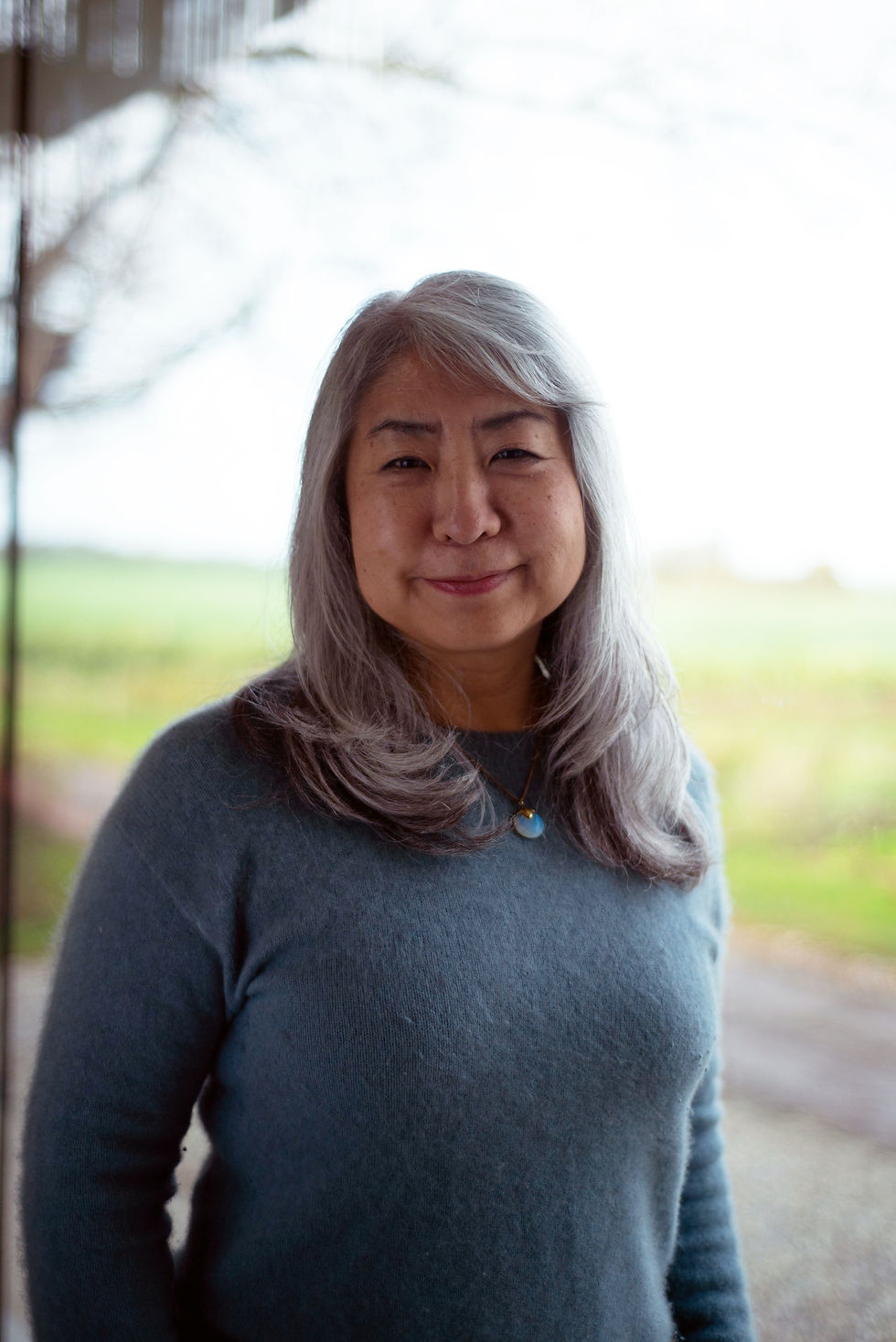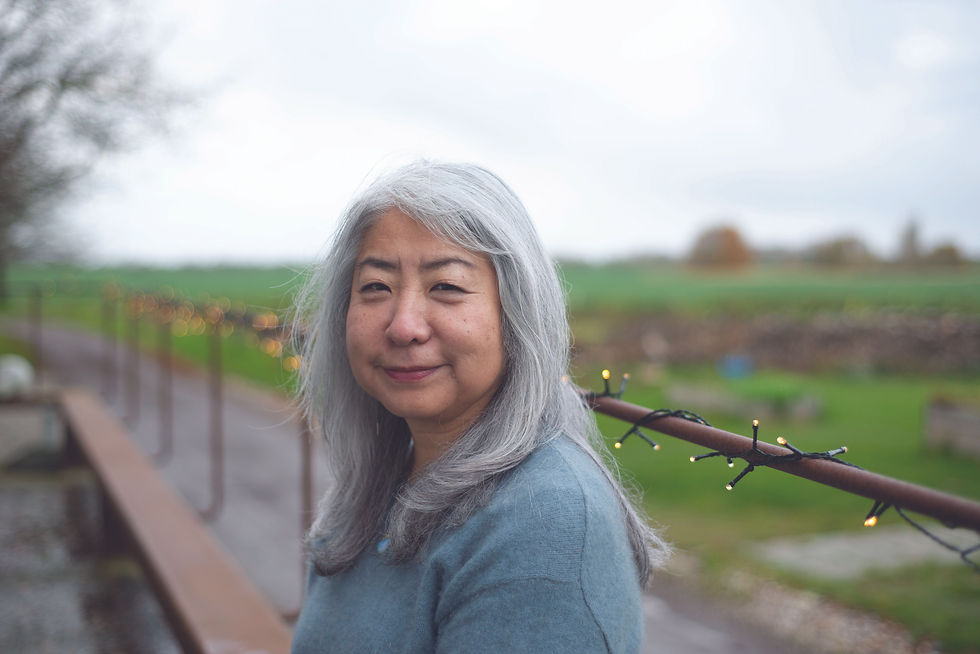Building bridges across cultures
- The International
- Dec 2, 2021
- 8 min read

Translating and traversing cultural differences is never easy. But Tomoko Kitamura Nielsen has seen a lot of transformations during her Danish experience.
Photographs: Terumi Mascarenhas - www.fjordfoto.dk
Text: Michaela Medveďová
When Tomoko Kitamura Nielsen boarded the plane from Amsterdam to Tokyo in 2000, she was changing where her life was headed.
The Japanese journalist was coming back from covering the 2000 European Football Championship. She was sitting next to a Danish guy who worked in Japan and returned from a summer vacation in Denmark.
As if in a romantic movie, they would later end up getting married.
And for her, this cross-border meet-cute was a premonition of a professional and personal story lived across cultures.
A Danish sense of calm
As in any international relationship, Tomoko and her Danish partner eventually discussed where they would settle. The pair decided in favour of his homeland - the Danish island of Lolland. "We talked about how once we have a child, it may be better for them to have an education in Denmark. He wasn't fond of the Japanese system - kids go to prep schools at an early age. But he thought they should learn by playing a bit longer."
The deal was sealed when Tomoko got the chance to visit Denmark and saw kindergarteners playing outside all day - and enjoying it to the fullest.
The speed of everyday life in the Scandinavian country also impressed her. In Tokyo, her schedule as a freelance translator for numerous TV stations and productions was very hectic. Yet, the Danish way of life was calm. "Nobody had a watch - nobody here was watching time. In Japan, people always have to know what time something is happening and how many people are coming. Danes just said we could have dinner together on the weekend. I was surprised - when exactly is the weekend? And where should we meet?"
Less impressive? The food. "It was kind of boring. Everything was brown and very heavy for me. But that has very much changed since then because of New Nordic Cuisine, a culinary movement that had a huge effect not just on expensive restaurants but also on the selection of ingredients in the supermarket or in ordinary cafes."
On the border of cultures
But the bland brown dishes did not turn out to be the biggest headache. When Tomoko relocated to Lolland in late 2001, joining the local community with strong relationships between families living in the area was difficult as many events were based on longstanding ties.
There weren't many Japanese people living in Lolland, which made it more challenging for her to become a part of the community. "People were looking at me like I was a rare animal," laughs Tomoko. "Although I wanted to have friends as soon as possible after arriving and tried saying hello to everyone, people were just staring at me, even though I was sure they spoke English. I think they were just curious about me and didn't know much about Japan." Eventually, she found helpful Lollanders trying to teach her the Danish way and the language and enquiring about the Japanese culture in return.
But the language did not come to Tomoko quickly. She started attending language school, but catching the meaning of casual conversations was difficult. "Danes get together often and are very talkative. But they didn't have much patience while waiting for me to join a conversation. Sometimes I could feel them thinking - why is she not saying anything?" It was a struggle for someone who has as much to say as Tomoko does to speak up.
Today, it is still challenging for her to write in Danish, but she has also been working as an interpreter from Japanese to Danish, for example, interpreting for the Japanese Minister about green transition or education.
Having her (now former) husband and his family there to ask endless questions about the language certainly helped her learn in the early days. So did raising her son, but it came with a price. "My former mother-in-law was very strict about not speaking Japanese with my son. That's something I regret." As a result, her now 18-year-old son understands Japanese but cannot reply. He's planning to go to Japan next year and learn more about the language and culture.
Raising him with a language barrier was sometimes frustrating for Tomoko. When he was little, her Danish was poorer, and it was challenging to communicate with him deeper. But there was also a cultural struggle. "Danish kids are more independent - adults and schools encourage them to think for themselves. In Japan, when parents tell you something, you have to listen." So as Tomoko was brought up the Japanese way, she had to learn how to raise her own child the Danish way.
Denmark and its culture have left their mark, though. "At one stage, I had an identity problem. When I visited my family and friends in Japan, they said I am not Japanese anymore because I forgot how I should behave in Japanese society. For example, if we eat together, the women should pour the beer or sake. So I was just sitting and drinking or pouring for myself."
But Tomoko knows she doesn't need to think about whether she is Japanese or Danish. She is something in between.
Making connections
Just as her identity, Tomoko's work is like a bridge between her two cultures.
But getting to professional fulfilment took time.
After language school, she got a job at a local TV station in Lolland as the next step in her career. "In the one and a half years there, I learned a lot. In local TV stations, you have to do nearly everything. I learned how to interview in Danish and film with a camera; how to edit and set up a studio." Apart from professional competencies, Tomoko met many people and learned a lot about Lolland and local politics.
But then, the strategy of the Ministry of Culture changed, and due to a lack of subsidies for local television, Tomoko was fired - which was a first for her.
"When I met the consultants at the Jobcenter, they looked at me and perhaps thought: Okay, she's from Asia, perhaps she could work as a social assistant or a cleaning lady." But luckily, when a new consultant read her CV and saw Tomoko had freelanced in Japan, they advised her to take an entrepreneurship course to help her start her own business in Denmark.

And she did. In her company, aTree, she now works as a journalist, writer, lecturer, consultant, and coordinator for creating connections between Denmark and Japan. "Often, I am working with both Japanese and Danish embassies. As a result, I meet many different kinds of people, from the Crown Prince to kindergarteners," laughs Tomoko.
She also arranges trips for Japanese people to visit Denmark and vice versa. In her experience, Japanese people are more interested in Denmark and Scandinavia because people in the region often rank as the happiest nations on earth. However, according to Tomoko, lately, Japanese people are more interested in how democracy, education, and welfare work in Denmark. She even wrote a book about Lolland, published in 2012 in Japanese.
But even though 2017 marked the 150th anniversary of Denmark and Japan's relationship, Japan is still an exotic country for Danes. "Japan is not great at sharing news or their latest issues in English with other countries. That's why Denmark has a small amount of information about Japan, and it's still sushi, karate, geishas, and yakuza that rule people's imagination, even though we have a lot more to tell."
Broadening cultural understanding is also the primary fuel behind Tomoko's effort to establish a new Lolland Folkehøjskole, a school focused on an international perspective on food. Because of climate change, politics and religion, different countries eat differently. We need to understand more about each other's food and how to share resources to ensure their proper distribution. Here, international cooperation could bring valuable insights. For example, "Danish politics is working a lot on green transition, and there's a lot of talk about Danes starting to eat less meat. Japan could really provide a lot of their experience and inspiration."
"There weren’t many Japanese people living in Lolland, which made it more challenging for her to become a part of the community. “People were looking at me like I was a rare animal,” laughs Tomoko."
Brand new excitement
A Folkehojskøle with an international focus is only a small example of how Lolland has been evolving. "I still feel some people are unsure about those who don't speak Danish, but generally, they are more positive about meeting new people." The refugee crisis in 2014, when Lollanders helped refugees from Syria settle down in the area, was a heartwarming example of this shift.
Because of the current construction of the Fehrman Belt Link, an immersed tunnel between Germany and Lolland, many foreigners are coming to the island. "Now, I can feel the excitement. People in Lolland are really starting to be excited about seeing new people."

The construction project was a key motivator for Tomoko to run for November's local elections - as the first Japanese citizen ever. When the tunnel is done, the 45-minute travel time between the two countries will be reduced to 5-7 minutes. "Politics will be critical in whether Lolland will be a place for European people to have a layover - or just drive through. The international perspective on how people from other countries look at Lolland is missing. Maybe I can help locals make even better decisions. I've had a chance to work between Denmark and Japan, so maybe I can use my experience."
Contrary to the custom nationwide, she only put up a few posters. Instead, in the weeks leading up to the election, Tomoko tried to meet people in person - explaining her stance and getting their support.
Unfortunately, when the polling stations closed on November 16, Tomoko wasn't among the 25 Lollanders elected to sit in the city council and shape the future of the region for the next four years.
As Denmark continues to welcome internationals in the coming years, the next local and regional elections might see them represented among the councilmen and women more. Having international voices in Danish politics is essential to Tomoko. "Sometimes, people don't know about our challenges. Maybe if we can tell them how we think and how we feel in Danish society, we can work together and make it better for all."

"We don’t need to compare Lolland to other places. We don’t have to loudly say that we have a better life. We know we have a good one."
A good life
But while her passport still claims she's an international, Lolland has been a part of her for twenty years now. She cares about her Danish home.
It gives her the luxury of space she did not have in Tokyo. "There, it was nearly impossible to be alone. Although you were in your apartment, you could still feel and hear people and cars outside." In Lolland, she can often find herself alone on a beautiful beach. Many Japanese people she brings to Denmark are captivated by this experience. "They are fascinated by seeing sunrise and sunset. In Tokyo, many can't do that because of the skyscrapers."
Compared to the bigger cities, Tomoko feels people in Lolland are more down-to-earth and appreciate the important things in life. They are not always preoccupied with something. Instead, Lollanders focus on being present with people they share the moment with.
"We don't need to compare Lolland to other places. We don't have to loudly say that we have a better life. We know we have a good one."









